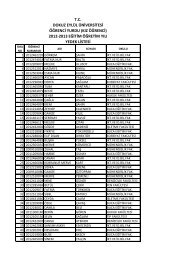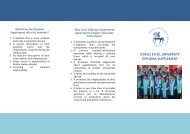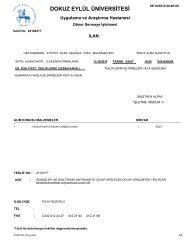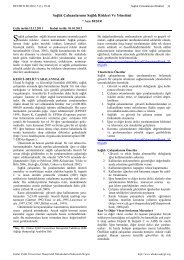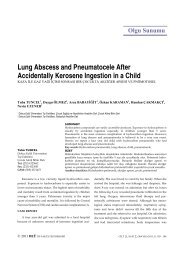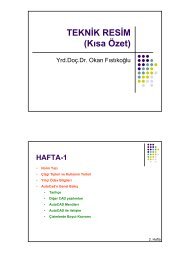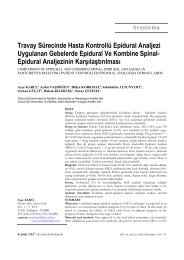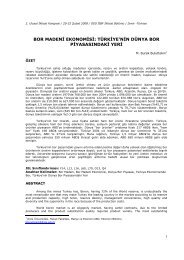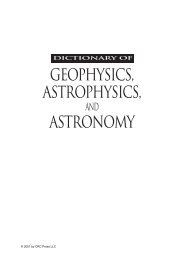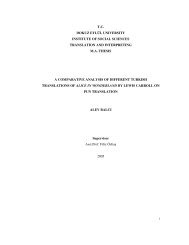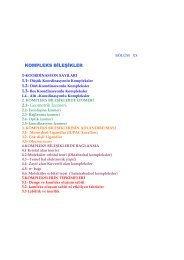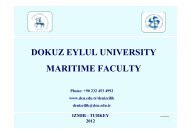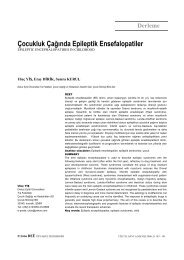the ideology of lexical choices in the turkish translations of oliver twist
the ideology of lexical choices in the turkish translations of oliver twist
the ideology of lexical choices in the turkish translations of oliver twist
Create successful ePaper yourself
Turn your PDF publications into a flip-book with our unique Google optimized e-Paper software.
INTRODUCTION<br />
S<strong>in</strong>ce <strong>the</strong> early 1990s, Translation Studies has been <strong>in</strong>fluenced by <strong>the</strong><br />
discipl<strong>in</strong>e <strong>of</strong> Cultural Studies. Susan Bassnett and André Lefevere are <strong>the</strong> two<br />
translation scholars who first mentioned <strong>the</strong> so-called ‘cultural turn’ <strong>in</strong> Translation<br />
Studies. In <strong>the</strong>ir <strong>in</strong>troduction to <strong>the</strong> collection <strong>of</strong> essays Translation, History and<br />
Culture, <strong>the</strong>y emphasized that “translation has been a major shap<strong>in</strong>g force <strong>in</strong> <strong>the</strong><br />
development <strong>of</strong> world culture” (1990; 12). The scholars <strong>of</strong> contemporary Translation<br />
Studies – like Bassnett and Lefevere – are no longer <strong>in</strong>terested <strong>in</strong> <strong>the</strong> l<strong>in</strong>guistic<br />
<strong>the</strong>ories <strong>of</strong> translation. Ra<strong>the</strong>r, as Christ<strong>in</strong>a Schäffner states <strong>in</strong> her article entitled<br />
“Political Discourse Analysis from <strong>the</strong> Po<strong>in</strong>t <strong>of</strong> View <strong>of</strong> Translation Studies,” <strong>the</strong>y<br />
concentrate on “social, cultural and communicative practices, on <strong>the</strong> cultural and<br />
ideological significance <strong>of</strong> translat<strong>in</strong>g and <strong>of</strong> <strong>translations</strong>, on <strong>the</strong> external politics <strong>of</strong><br />
translation, on <strong>the</strong> relationship between translation behavior and socio-cultural<br />
factors” (2004; 136). That is to say, <strong>the</strong>y have begun to recognize <strong>the</strong> “complexity <strong>of</strong><br />
<strong>the</strong> phenomenon <strong>of</strong> translation”, and focus on “social causation and human agency”<br />
and <strong>the</strong> “effects ra<strong>the</strong>r than <strong>the</strong> <strong>in</strong>ternal structures” (ibid.). Bassnett expla<strong>in</strong>s <strong>the</strong><br />
‘cultural turn’ <strong>in</strong> <strong>the</strong> article “The Translation Turn <strong>in</strong> Cultural Studies” (Bassnett &<br />
Lefevere (eds.), 1998; 123) as:<br />
a way <strong>of</strong> understand<strong>in</strong>g how complex manipulative textual processes take place: how<br />
a text is selected for translation, for example, what role <strong>the</strong> translator plays <strong>in</strong> that<br />
selection, what role an editor, a publisher or patron plays, what criteria determ<strong>in</strong>e <strong>the</strong><br />
strategies that will be employed by <strong>the</strong> translator, how a text might be received <strong>in</strong> <strong>the</strong><br />
target system. For a translation always takes place <strong>in</strong> a cont<strong>in</strong>uum, never <strong>in</strong> a void,<br />
and <strong>the</strong>re are all k<strong>in</strong>ds <strong>of</strong> textual and extratextual constra<strong>in</strong>ts upon <strong>the</strong> translator.<br />
One <strong>of</strong> <strong>the</strong> newly addressed issues <strong>in</strong> Translation Studies is <strong>the</strong> relationship<br />
between discourse and <strong>ideology</strong>, two concepts related with culture. In<br />
Communication Across Cultures-Translation Theory and Contrastive Text<br />
L<strong>in</strong>guistics, Basil Hatim refers to <strong>the</strong> notion <strong>of</strong> discourse as “<strong>the</strong> attitud<strong>in</strong>ally<br />
determ<strong>in</strong>ed mode <strong>of</strong> expression,” and he po<strong>in</strong>ts out that it is “particularly privileged<br />
as a carrier <strong>of</strong> ideological mean<strong>in</strong>gs” (2000; 174). Indeed, <strong>ideology</strong> appears to be one<br />
<strong>of</strong> <strong>the</strong> crucial features <strong>of</strong> discursive expression, and <strong>the</strong> analyses <strong>of</strong> ideological<br />
structures have proved useful <strong>in</strong> provid<strong>in</strong>g <strong>in</strong>sights <strong>in</strong>to <strong>the</strong> study <strong>of</strong> language and<br />
discourse. In Teach<strong>in</strong>g and Research<strong>in</strong>g Translation, Hatim touches upon some<br />
x



